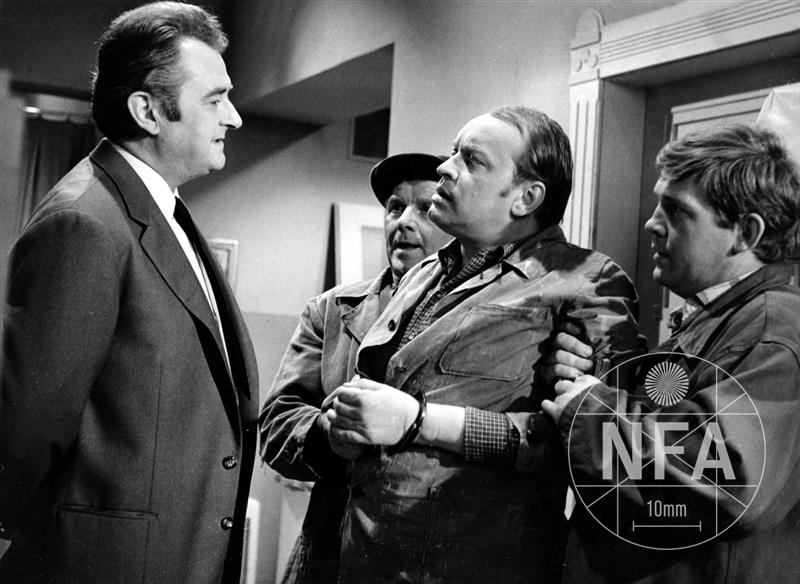Man Is Not Alone
Country
CzechoslovakiaCopyright
1971Production year
1971Premiere
25 February 1972Runtime
87 minDirector
Josef MachCategory
filmGenre
drama, psychologicalTypology
featuretheatrical distributionlongOriginal title
Člověk není sámCzech title
Člověk není sámEnglish title
Man Is Not AloneSummary
Director Josef Mach demonstrated his loyalty to the regime with this 1971 psychological drama, which represents a typical example of a film production during the early period of “normalisation”. Pro-regime-oriented writer and scriptwriter Ivan Gariš contributed to the script for a story that is set in the 1950s. The protagonist is a capable engineer who is given a fresh chance despite the fact that he has not taken part in the general “constructive” enthusiasm sought by the communists. However, thanks to the obliging chairman of the enterprise’s communist party committee, he is able to recognise his mistake. He then goes on to expose a conspiracy of emigrants who are trying to obtain his discovery. Jiřina Švorcová features in the emblematic role of an orthodox communist. She had played similar roles stretching back two decades.
Synopsis
The year is 1953. Engineer Jaroslav Král has not joined in the enthusiastic efforts to rebuild the country initiated after the Communist takeover in February 1948, and has been relocated to the archives. The chairwoman of the factory's Communist party committee Lída Jostová wants to help Král and invites him to join an important research project. Král receives an unexpected visit from his former friend Weber, who moves in with him without explanation. Král is puzzled by the situation as Weber had actually emigrated some years before. He has returned to the country illegally with the object of getting possession of Král's invention. Král doesn't know what to do; he is frightened but doesn't turn Weber in. Weber goes to Král's country cottage where he and a policeman are shot by the assassin Karel Švarc. Král is detained but the investigator Major Sýkora, influenced by Jostová, does not believe him guilty. Král tells the Major that he wants to finish his invention quickly. The Major agrees and Král is now free to work in police custody. In the meantime, the search for Švarc continues. The assassin seems to be hiding at the home of certain Krásová. One of the policemen manages to get into Krásová's flat dressed as a plumber and succeeds in capturing Švarc. Krásová is also arrested. Král's innocence is confirmed and he is set free. At the factory institute, he completes his invention. He meets Jostová, who has been helping him throughout his captivity. The two evidently will be more than just friends.
Cast
Jiřina Švorcová
Ing. Lída Jostová, předsedkyně ZO KSČ
Zdeněk Kampf
inženýr Jaroslav Král
Jiří Sovák
major Josef Sýkora
Vladimír Šmeral
plukovník Malát
Jan Libíček
vězeň Láďa
Jan Schánilec
poručík František Záhorský
Oldřich Lukeš
Petřík, ředitel výzkumného ústavu
Vladimír Hlavatý
lesák Pánek
Marie Drahokoupilová
Jarmila Krásová
Jan Teplý
Karel Švarc, bratr Krásové
Jarmila Smejkalová
Králova bývalá žena
Věra Tichánková
správcová Kateřina Stýblová
Vladimír Hrabánek
příslušník VB alias plynárenský zřízenec
Milan Klásek
emigrant Stanislav Weber
Václav Mareš
inženýr Přibyl
Ladislav Trojan
kapitán Hanka
Vladimír Bičík
podporučík Urban
Miroslav Saic
Mirek
Karel Sekera
příslušník StB
Mariana Štepitová
sekretářka
Milan Stehlík
poručík VB
Ladislav Kazda
okrskář Jiří Louda
Bedřich Čapek
vrátný
Jan Faltýnek
řidič StB Pepíček
Lenka Fišerová
sekretářka na VB
Karel Hábl
poručík Malát
Vladimír Huber
zřízenec
Jiří Kasík
plynař
Bohumil Křížek
staršina VB
Hana Kudrnáčová
mladá žena
Josef Smejkal
mladý příslušník StB
Karel Pavlík
dozorce
Vladimír Pospíšil
příslušník StB
Alena Procházková
radistka Zdenička
Pavel Radosta
zámečník
Svatopluk Skládal
hostinský
Blažena Slavíčková
šatnářka
Eduard Pavlíček
Voice by Jindřich Narenta
muž v lesnickém
Jaroslav Tomsa
Voice by Zdeněk Ornest
muž-stín
Miloš Vavruška
kapitán Líska
Crew and creators
Director
Second Unit Director
Assistant Director
Continuity
Screenstory
Screenplay
Shooting Script
Dramaturg
Director of Photography
Second Unit Photography
Camera Operator
Production Designer
Assistent Production Designer
Set Designer
Karel Janda (2), Jiří Bžoch, Karel Kracík
Costume Designer
Costumes
Make-Up Artist
Film Editor
Assistant Film Editor
Sound Designer
Production Manager
Unit Production Manager
Václav Havlík, František Nedvěd
Consultant
pplk. František Havlíček
Cooperation
Věra Kadeřábková (klapka), Karel Šebík (fotograf)
Music
Music Composed by
Music Performed by
FISYO (Music Conducted by Štěpán Koníček)
Songs
U nás jaro nekončí
Song Composer Ludvík Podéšť
Writer of Lyrics Vlastimil Pantůček
Singer Milan Směták
Dobrou noc
Song Composer Zdeněk Petr
Writer of Lyrics Vladimír Dvořák
Singer Rudolf Cortés
Váš dům šel spát
Song Composer Alfons Jindra
Writer of Lyrics Vladimír Dvořák
Singer Josef Zíma
Production info
Original Title
Člověk není sám
Czech Title
Člověk není sám
English Title
Man Is Not Alone
Category
film
Typology
featuretheatrical distribution
Genre
drama, psychological
Origin country
Czechoslovakia
Copyright
1971
Production Year
1971
Production specifications
literary Screenplay approved 3 January 1971
technical Screenplay approved 14 April 1971
start of filming 27 May 1971
end of filming 4 August 1971
projection approval 15 October 1971
the first film copy approved 9 November 1971
withdrawal from distribution 31 December 1986
Premiere
premiere 24 February 1972 /suitable for youths/ (kina Sevastopol a Flora, Praha)
premiere 25 February 1972 /suitable for youths/ (celostátní)
Production
Copyright Holders
Distribution
Creative Group
Dramaturgická skupina Vojtěcha Trapla, Vojtěch Trapl (vedoucí dramaturgické skupiny), Výrobní skupina Jiřího Šebora, Jiří Šebor (vedoucí výrobní skupiny)
Technical info
Duration typology
feature film
Duration in minutes
87 min
Original length in metres
2 456 meters
Distribution carrier
16mm, 35mm
Aspect ratio
1:1,66
Colour
black & white
Sound
sound
Sound system/format
mono
Versions
Czech
Dialogue languages
Czech
Subtitles languages
without subtitles
Opening/End credits languages
Czech
Awards
Vítěz
Festival: 10. festival českých a slovenských filmů Plzeň
1972
Plzeň / Czechoslovakia
Ivan Gariš
Vítěz
Festival: 10. festival českých a slovenských filmů Plzeň
1972
Plzeň / Czechoslovakia
Josef Picek




